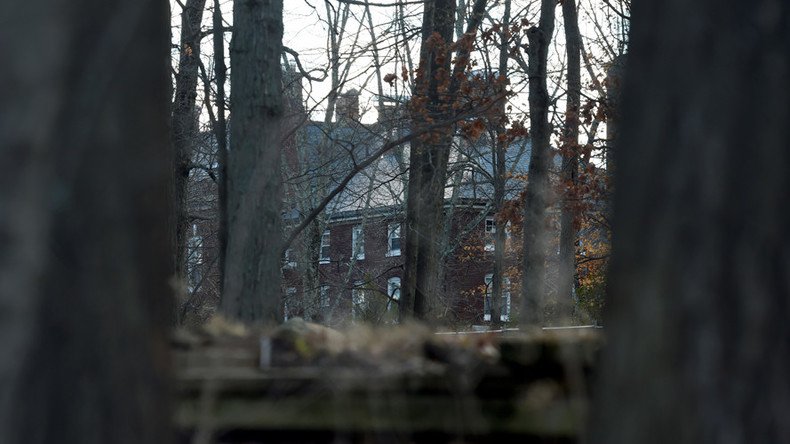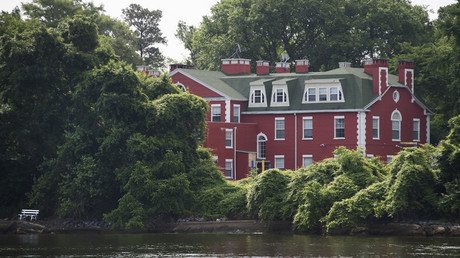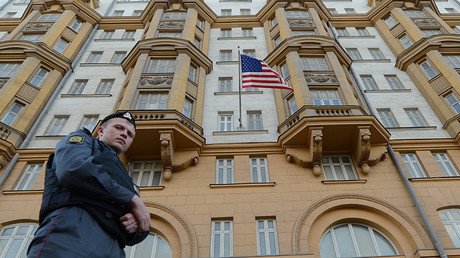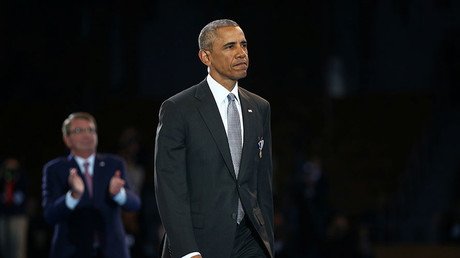Straitjacket of Russophobia prevents Trump returning seized Russian property

The protracted row over the US’ seizure of Russian diplomatic property illustrates how Russophobia has become a dangerous impediment to healthy bilateral relations. All contact with Russia is being seen through a prism of anti-Russia hysteria.
Seven months after ex-US President Barack Obama ordered the confiscation of two Russian diplomatic compounds and the expulsion of 35 diplomats and their families, the row trundles on – much to Moscow’s vexation.
This week, Russian Deputy Foreign Minister Sergey Ryabkov held lengthy discussions with US Undersecretary of State Thomas Shannon in Washington DC to try to resolve the matter. After two hours of talks, there seems to have been no resolution.
Russia has reportedly said it reserves the right to retaliate by seizing US diplomatic property and expelling American officials.
Ominously, a senior US State Department official, John Sullivan, this week told the Senate Foreign Affairs Committee that the Trump administration would consult with Congress on any decisions taken. The official also said that the diplomatic property issue was “one of a whole host of issues that we are discussing with the Russia Federation”. That indicates the Trump administration is treating the return of Russian sovereign assets as part of a bargaining process. Meaning the row is being used in a provocative manner as leverage over the Russian side.
This is exactly what Russia has warned against.
Ahead of the talks in Washington, Russia’s Foreign Minister Sergey Lavrov said if the properties and diplomatic functioning of his country were not restored immediately, then that delay amounted to “daylight robbery”.
Russia’s grievance is understandable. The confiscation and closure of two of its diplomatic compounds in Washington DC and Maryland was ordered by the Obama administration on December 29. The move was said to be in response to an assessment made by US intelligence agencies that Russia had interfered in the November presidential elections to disadvantage Democrat contender Hillary Clinton.
Russia has rejected any allegations that it hacked into the US election. Moscow also points out that no evidence has ever been presented to support the claims made against it. Yet on the back of unsubstantiated allegations of Russian interference, the US seized its diplomatic facilities and expelled staff from the country. This draconian move by the US is a violation of the 1961 Vienna Convention governing diplomatic relations between nations.
Republican presidential winner Donald Trump has repeatedly dismissed claims that Russia interfered in the US elections as “fake news”. He dismisses speculation that his campaign team colluded with Russian government agents to disseminate damaging information about his rival.
So, here we have a striking case of double think. The Trump administration, or at least those close to the president, is of the view that allegations of Russian interference in the US election are baseless, yet the administration has so far refused to return property to Russia which was confiscated on the basis of alleged Russian electoral subterfuge.
Trump’s apparent inability to promptly resolve the dispute by doing the right thing – return the properties to Russia – is testimony to the anti-Russia hysteria that has gripped Washington and the US media.
There are no grounds for the US to continue its seizure of the Russian compounds. There is no evidence of Moscow subverting the presidential election, despite nearly seven months of Congressional investigations, as well as a separate probe carried out by a special prosecutor. There is only the cloud of constant media speculation and claims made by anonymous intelligence sources.
Evidently, Trump is paralyzed by the toxic atmosphere of Russophobia in Washington. Because he cannot act on his own judgement.
If he is seen to do the decent thing and return the Russian property that will be immediately blown up and distorted as “evidence” of Trump being in Russia’s pocket for the “favors” of collusion.
The brouhaha over Trump’s son Donald Jr and his son-in-law Jared Kushner meeting a Russian lawyer last year is another media storm in the teacup about alleged collusion. But the cumulative effect of constant media speculation linking president Trump to Russia inevitably places a straitjacket on normal relations between the two countries.
The meeting between Trump and Russian president Vladimir Putin at the G20 summit earlier this month is another illustration of the toxic impact. The two leaders held a cordial meeting and dealt with several substantive issues over the course of a two-hour discussion. However, while the positive meeting heralded a welcome restoration of normal relations, Trump was quickly put on the defensive by critical media coverage back home.
Likewise the protracted spat over Russian diplomatic property is another hostage to Russophobia. The Trump administration is caught in a contradiction. If the claims of Russian interference in the US elections are fake, as Trump maintains, then there is no logical justification for the continued withholding of Russian property.
The violation of Russian sovereign rights is bound to be seen by Moscow as a gratuitous provocation. When Obama imposed the diplomatic sanctions back in December, the Kremlin did not retaliate then. Instead, it responded magnanimously by inviting American diplomats and their families to official Christmas and New Year celebrations in Moscow.
At around that time, president-elect Trump’s incoming National Security Adviser Michael Flynn held private discussions with Russian ambassador to the US, Sergey Kislyak. According to media reports, US intelligence snooping claimed that Flynn told Kislyak the sanctions would be lifted by the new Trump administration. This may have been why Putin did not retaliate against Obama’s diplomatic confiscations and expulsions.
Shortly after, Trump was forced to sack Flynn for not fully disclosing his communications with the Russian ambassador. This was not an early piece of evidence of "collusion;" rather, it was an early casualty in the US media-intel campaign of Russophobia that has paralyzed the Trump administration from doing any normal business with Moscow.
For the US to issue preconditions that the diplomatic properties will be returned in exchange for “improved behavior” from Russia on international matters is an outrageous insult. It’s tantamount to imposing a ransom for goods stolen by the US side.
This is the stuff of agitating aggression towards Russia. During the heyday of the Cold War, there was no such comparable violation of diplomatic rights. Yet, here we are on the back of empty allegations and hysterical Russophobia witnessing an unprecedented affront to Russian sovereign rights.
The reckless infringement by the US is goading reciprocal moves by Russia. After seven months of provocation on this issue, the pressure is on Moscow to retaliate. That will inevitably lead to even more downward spiral in relations. And so it goes. This is how wars are incited.
The Trump administration is paralyzed inside and out. The US Ambassador to the UN, Nikki Haley, is a spigot for anti-Russian claims that Moscow interfered in the American elections. “Everyone knows Russia interfered,”says Haley, unburdened by any need to substantiate her assertion.
With the US media, Washington and the Deep State pummeling Trump on a daily basis over alleged Russia collusion, it is not surprising this White House is under siege to act reasonably on the matter of Russian diplomatic property. Bilateral relations remain trapped in a straitjacket of Russophobia.
The statements, views and opinions expressed in this column are solely those of the author and do not necessarily represent those of RT.
















